University Essay: Comparing Erikson and Piaget on Human Development
VerifiedAdded on 2023/01/17
|6
|1672
|1
Essay
AI Summary
This essay delves into the realm of human development, focusing on the contrasting yet complementary theories of Erik Erikson and Jean Piaget. The author begins by reflecting on a personal childhood experience, specifically an incident in the second grade where academic struggles led to feelings of inadequacy and social isolation. This personal narrative serves as a backdrop for a thorough examination of Erikson's psychosocial stages and Piaget's cognitive developmental stages. The essay highlights the core differences between the two theories, with Erikson emphasizing the impact of life events on emotional development across the lifespan and Piaget concentrating on cognitive development during childhood and adolescence. The author uses the childhood incident to illustrate how both theories provide valuable frameworks for understanding the psychological impact of experiences and the importance of addressing developmental challenges. The essay concludes by emphasizing the significance of these theories in informing pedagogical approaches and fostering a holistic understanding of child development.
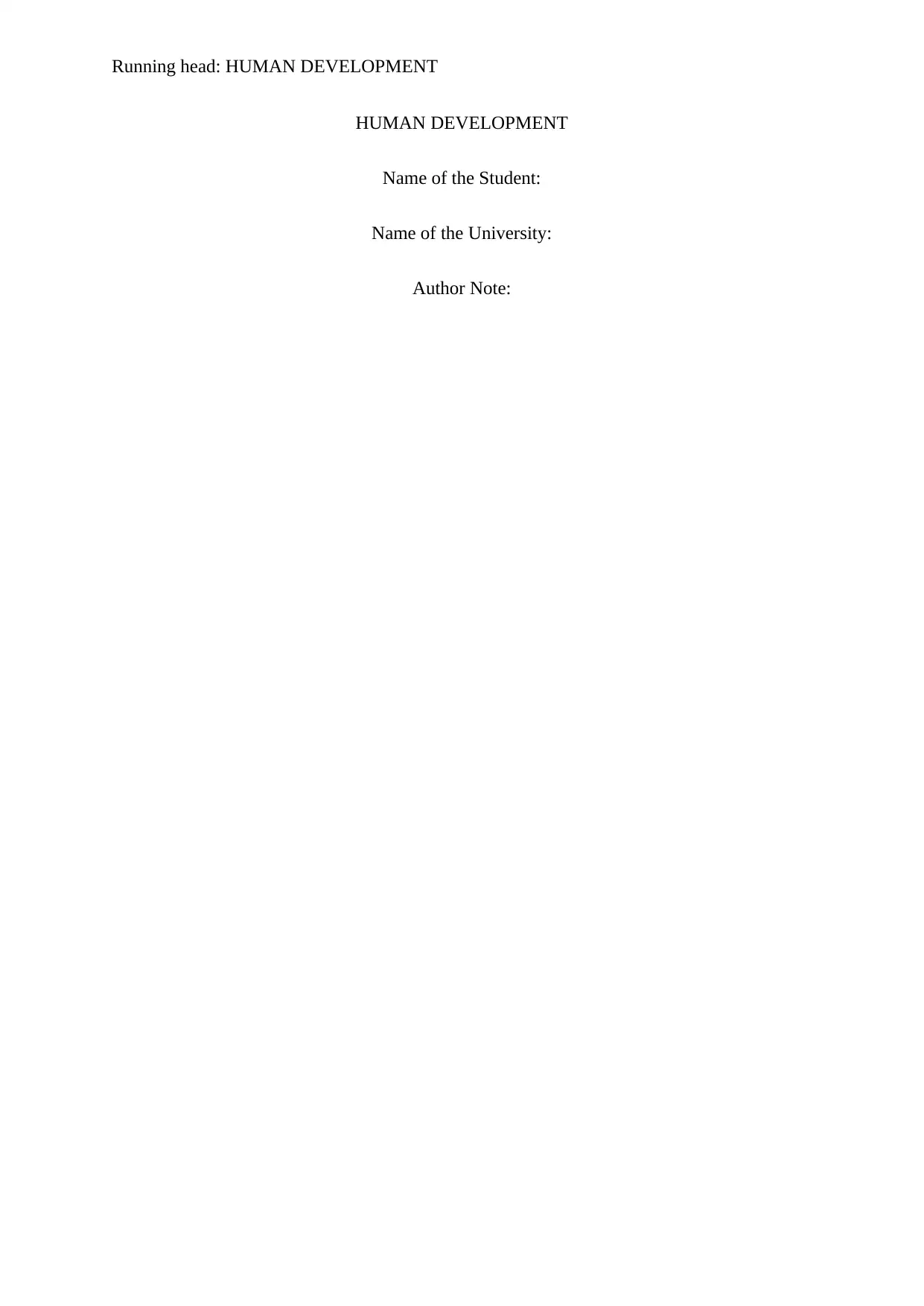
Running head: HUMAN DEVELOPMENT
HUMAN DEVELOPMENT
Name of the Student:
Name of the University:
Author Note:
HUMAN DEVELOPMENT
Name of the Student:
Name of the University:
Author Note:
Paraphrase This Document
Need a fresh take? Get an instant paraphrase of this document with our AI Paraphraser
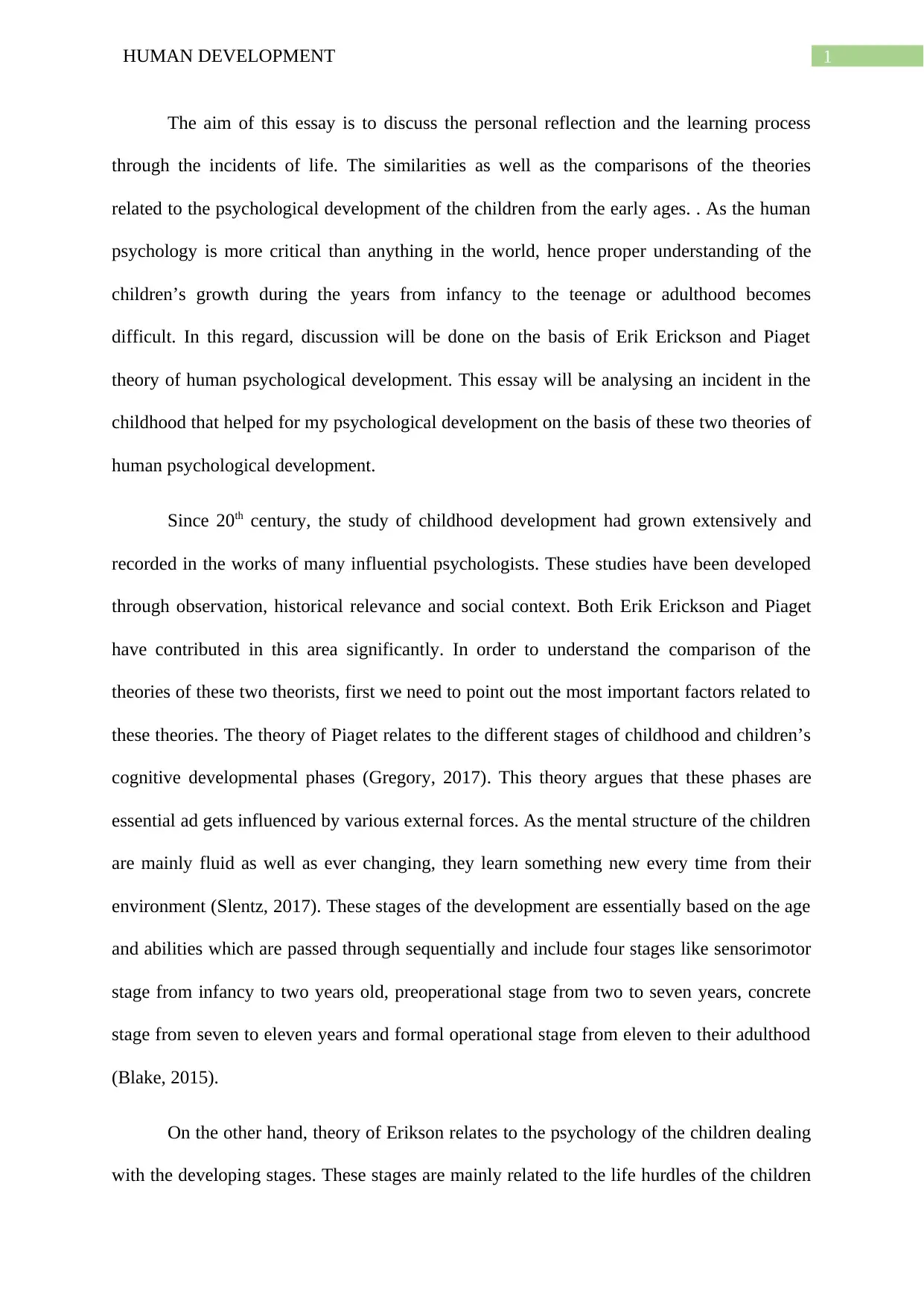
1HUMAN DEVELOPMENT
The aim of this essay is to discuss the personal reflection and the learning process
through the incidents of life. The similarities as well as the comparisons of the theories
related to the psychological development of the children from the early ages. . As the human
psychology is more critical than anything in the world, hence proper understanding of the
children’s growth during the years from infancy to the teenage or adulthood becomes
difficult. In this regard, discussion will be done on the basis of Erik Erickson and Piaget
theory of human psychological development. This essay will be analysing an incident in the
childhood that helped for my psychological development on the basis of these two theories of
human psychological development.
Since 20th century, the study of childhood development had grown extensively and
recorded in the works of many influential psychologists. These studies have been developed
through observation, historical relevance and social context. Both Erik Erickson and Piaget
have contributed in this area significantly. In order to understand the comparison of the
theories of these two theorists, first we need to point out the most important factors related to
these theories. The theory of Piaget relates to the different stages of childhood and children’s
cognitive developmental phases (Gregory, 2017). This theory argues that these phases are
essential ad gets influenced by various external forces. As the mental structure of the children
are mainly fluid as well as ever changing, they learn something new every time from their
environment (Slentz, 2017). These stages of the development are essentially based on the age
and abilities which are passed through sequentially and include four stages like sensorimotor
stage from infancy to two years old, preoperational stage from two to seven years, concrete
stage from seven to eleven years and formal operational stage from eleven to their adulthood
(Blake, 2015).
On the other hand, theory of Erikson relates to the psychology of the children dealing
with the developing stages. These stages are mainly related to the life hurdles of the children
The aim of this essay is to discuss the personal reflection and the learning process
through the incidents of life. The similarities as well as the comparisons of the theories
related to the psychological development of the children from the early ages. . As the human
psychology is more critical than anything in the world, hence proper understanding of the
children’s growth during the years from infancy to the teenage or adulthood becomes
difficult. In this regard, discussion will be done on the basis of Erik Erickson and Piaget
theory of human psychological development. This essay will be analysing an incident in the
childhood that helped for my psychological development on the basis of these two theories of
human psychological development.
Since 20th century, the study of childhood development had grown extensively and
recorded in the works of many influential psychologists. These studies have been developed
through observation, historical relevance and social context. Both Erik Erickson and Piaget
have contributed in this area significantly. In order to understand the comparison of the
theories of these two theorists, first we need to point out the most important factors related to
these theories. The theory of Piaget relates to the different stages of childhood and children’s
cognitive developmental phases (Gregory, 2017). This theory argues that these phases are
essential ad gets influenced by various external forces. As the mental structure of the children
are mainly fluid as well as ever changing, they learn something new every time from their
environment (Slentz, 2017). These stages of the development are essentially based on the age
and abilities which are passed through sequentially and include four stages like sensorimotor
stage from infancy to two years old, preoperational stage from two to seven years, concrete
stage from seven to eleven years and formal operational stage from eleven to their adulthood
(Blake, 2015).
On the other hand, theory of Erikson relates to the psychology of the children dealing
with the developing stages. These stages are mainly related to the life hurdles of the children
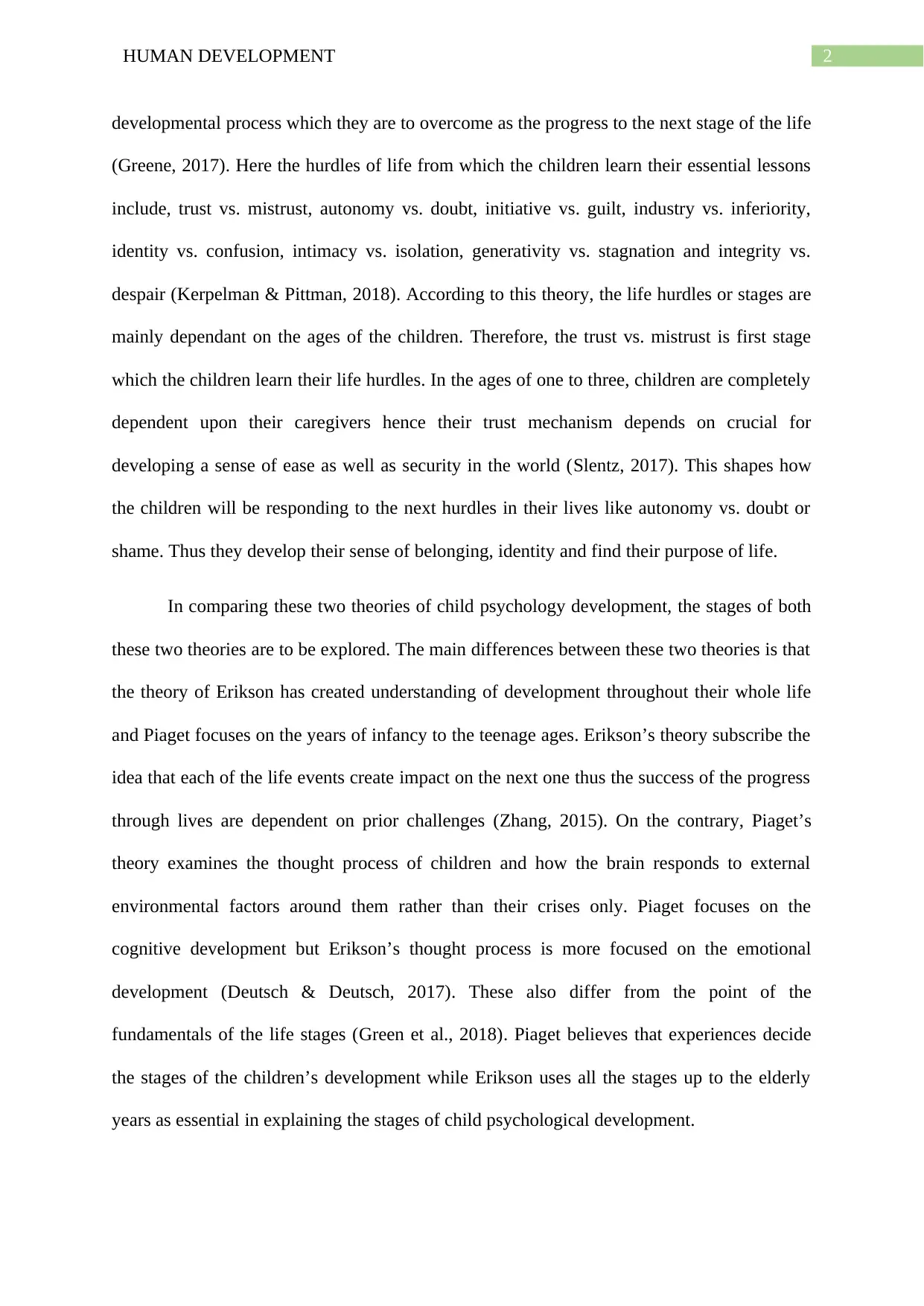
2HUMAN DEVELOPMENT
developmental process which they are to overcome as the progress to the next stage of the life
(Greene, 2017). Here the hurdles of life from which the children learn their essential lessons
include, trust vs. mistrust, autonomy vs. doubt, initiative vs. guilt, industry vs. inferiority,
identity vs. confusion, intimacy vs. isolation, generativity vs. stagnation and integrity vs.
despair (Kerpelman & Pittman, 2018). According to this theory, the life hurdles or stages are
mainly dependant on the ages of the children. Therefore, the trust vs. mistrust is first stage
which the children learn their life hurdles. In the ages of one to three, children are completely
dependent upon their caregivers hence their trust mechanism depends on crucial for
developing a sense of ease as well as security in the world (Slentz, 2017). This shapes how
the children will be responding to the next hurdles in their lives like autonomy vs. doubt or
shame. Thus they develop their sense of belonging, identity and find their purpose of life.
In comparing these two theories of child psychology development, the stages of both
these two theories are to be explored. The main differences between these two theories is that
the theory of Erikson has created understanding of development throughout their whole life
and Piaget focuses on the years of infancy to the teenage ages. Erikson’s theory subscribe the
idea that each of the life events create impact on the next one thus the success of the progress
through lives are dependent on prior challenges (Zhang, 2015). On the contrary, Piaget’s
theory examines the thought process of children and how the brain responds to external
environmental factors around them rather than their crises only. Piaget focuses on the
cognitive development but Erikson’s thought process is more focused on the emotional
development (Deutsch & Deutsch, 2017). These also differ from the point of the
fundamentals of the life stages (Green et al., 2018). Piaget believes that experiences decide
the stages of the children’s development while Erikson uses all the stages up to the elderly
years as essential in explaining the stages of child psychological development.
developmental process which they are to overcome as the progress to the next stage of the life
(Greene, 2017). Here the hurdles of life from which the children learn their essential lessons
include, trust vs. mistrust, autonomy vs. doubt, initiative vs. guilt, industry vs. inferiority,
identity vs. confusion, intimacy vs. isolation, generativity vs. stagnation and integrity vs.
despair (Kerpelman & Pittman, 2018). According to this theory, the life hurdles or stages are
mainly dependant on the ages of the children. Therefore, the trust vs. mistrust is first stage
which the children learn their life hurdles. In the ages of one to three, children are completely
dependent upon their caregivers hence their trust mechanism depends on crucial for
developing a sense of ease as well as security in the world (Slentz, 2017). This shapes how
the children will be responding to the next hurdles in their lives like autonomy vs. doubt or
shame. Thus they develop their sense of belonging, identity and find their purpose of life.
In comparing these two theories of child psychology development, the stages of both
these two theories are to be explored. The main differences between these two theories is that
the theory of Erikson has created understanding of development throughout their whole life
and Piaget focuses on the years of infancy to the teenage ages. Erikson’s theory subscribe the
idea that each of the life events create impact on the next one thus the success of the progress
through lives are dependent on prior challenges (Zhang, 2015). On the contrary, Piaget’s
theory examines the thought process of children and how the brain responds to external
environmental factors around them rather than their crises only. Piaget focuses on the
cognitive development but Erikson’s thought process is more focused on the emotional
development (Deutsch & Deutsch, 2017). These also differ from the point of the
fundamentals of the life stages (Green et al., 2018). Piaget believes that experiences decide
the stages of the children’s development while Erikson uses all the stages up to the elderly
years as essential in explaining the stages of child psychological development.
⊘ This is a preview!⊘
Do you want full access?
Subscribe today to unlock all pages.

Trusted by 1+ million students worldwide
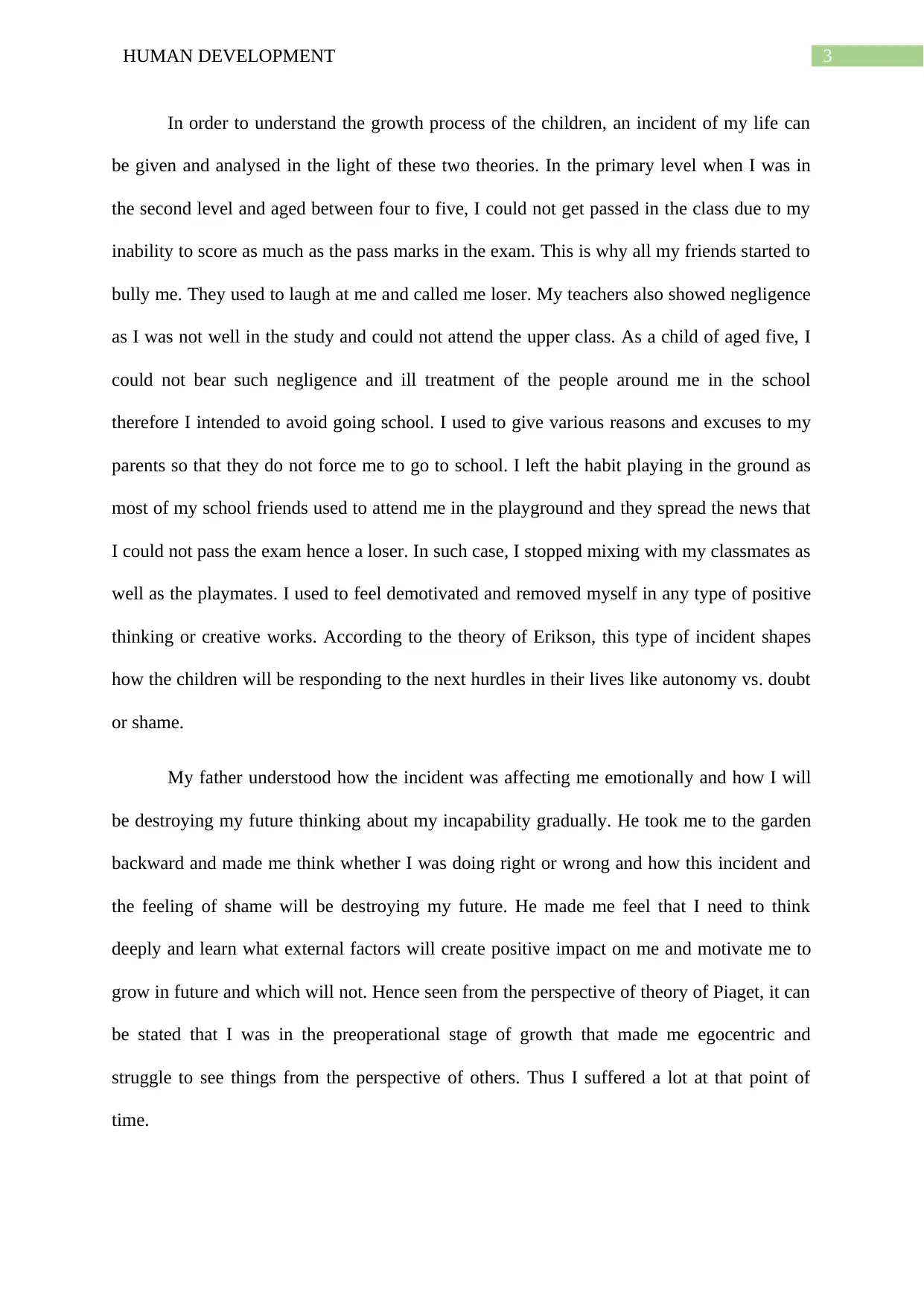
3HUMAN DEVELOPMENT
In order to understand the growth process of the children, an incident of my life can
be given and analysed in the light of these two theories. In the primary level when I was in
the second level and aged between four to five, I could not get passed in the class due to my
inability to score as much as the pass marks in the exam. This is why all my friends started to
bully me. They used to laugh at me and called me loser. My teachers also showed negligence
as I was not well in the study and could not attend the upper class. As a child of aged five, I
could not bear such negligence and ill treatment of the people around me in the school
therefore I intended to avoid going school. I used to give various reasons and excuses to my
parents so that they do not force me to go to school. I left the habit playing in the ground as
most of my school friends used to attend me in the playground and they spread the news that
I could not pass the exam hence a loser. In such case, I stopped mixing with my classmates as
well as the playmates. I used to feel demotivated and removed myself in any type of positive
thinking or creative works. According to the theory of Erikson, this type of incident shapes
how the children will be responding to the next hurdles in their lives like autonomy vs. doubt
or shame.
My father understood how the incident was affecting me emotionally and how I will
be destroying my future thinking about my incapability gradually. He took me to the garden
backward and made me think whether I was doing right or wrong and how this incident and
the feeling of shame will be destroying my future. He made me feel that I need to think
deeply and learn what external factors will create positive impact on me and motivate me to
grow in future and which will not. Hence seen from the perspective of theory of Piaget, it can
be stated that I was in the preoperational stage of growth that made me egocentric and
struggle to see things from the perspective of others. Thus I suffered a lot at that point of
time.
In order to understand the growth process of the children, an incident of my life can
be given and analysed in the light of these two theories. In the primary level when I was in
the second level and aged between four to five, I could not get passed in the class due to my
inability to score as much as the pass marks in the exam. This is why all my friends started to
bully me. They used to laugh at me and called me loser. My teachers also showed negligence
as I was not well in the study and could not attend the upper class. As a child of aged five, I
could not bear such negligence and ill treatment of the people around me in the school
therefore I intended to avoid going school. I used to give various reasons and excuses to my
parents so that they do not force me to go to school. I left the habit playing in the ground as
most of my school friends used to attend me in the playground and they spread the news that
I could not pass the exam hence a loser. In such case, I stopped mixing with my classmates as
well as the playmates. I used to feel demotivated and removed myself in any type of positive
thinking or creative works. According to the theory of Erikson, this type of incident shapes
how the children will be responding to the next hurdles in their lives like autonomy vs. doubt
or shame.
My father understood how the incident was affecting me emotionally and how I will
be destroying my future thinking about my incapability gradually. He took me to the garden
backward and made me think whether I was doing right or wrong and how this incident and
the feeling of shame will be destroying my future. He made me feel that I need to think
deeply and learn what external factors will create positive impact on me and motivate me to
grow in future and which will not. Hence seen from the perspective of theory of Piaget, it can
be stated that I was in the preoperational stage of growth that made me egocentric and
struggle to see things from the perspective of others. Thus I suffered a lot at that point of
time.
Paraphrase This Document
Need a fresh take? Get an instant paraphrase of this document with our AI Paraphraser
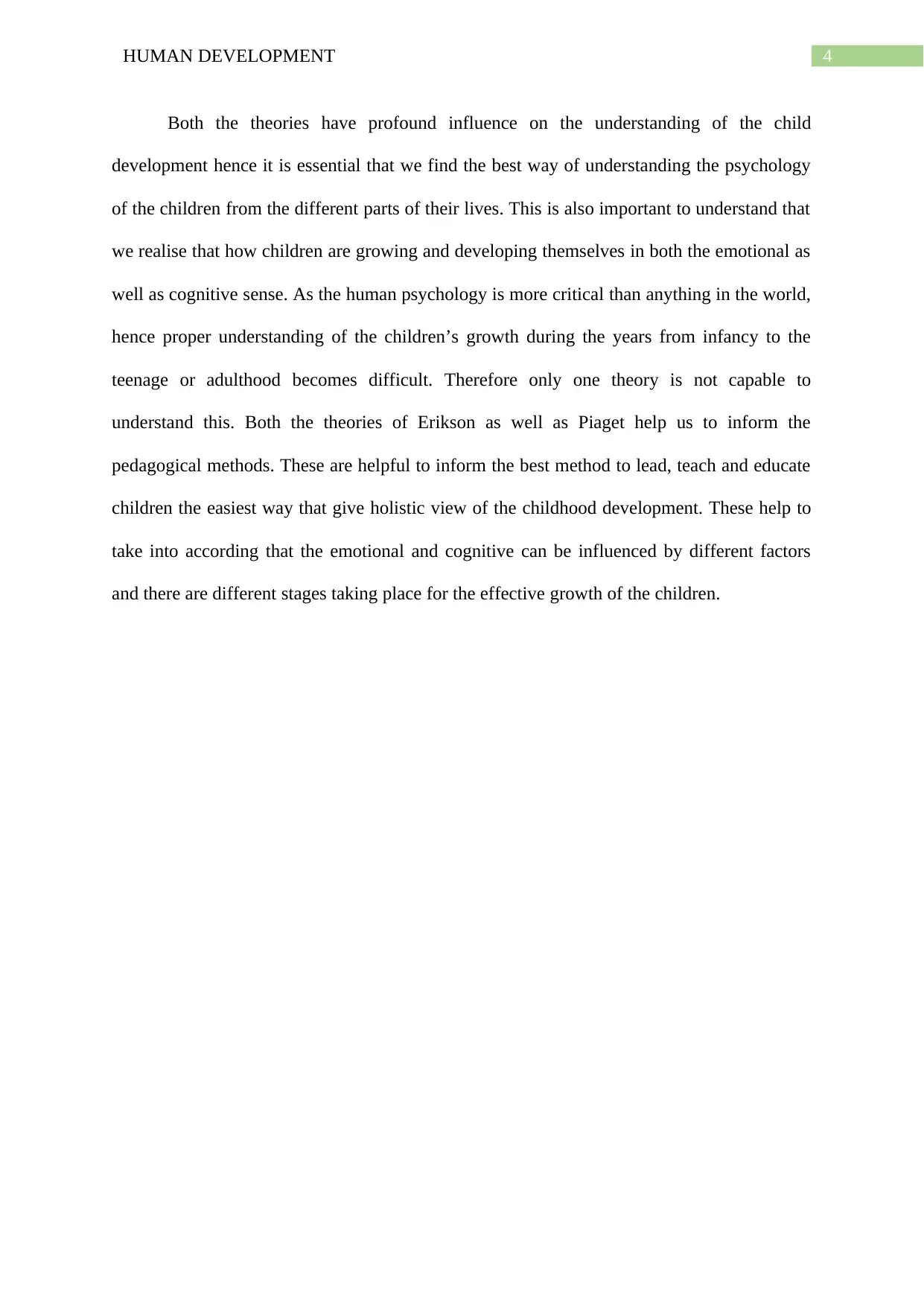
4HUMAN DEVELOPMENT
Both the theories have profound influence on the understanding of the child
development hence it is essential that we find the best way of understanding the psychology
of the children from the different parts of their lives. This is also important to understand that
we realise that how children are growing and developing themselves in both the emotional as
well as cognitive sense. As the human psychology is more critical than anything in the world,
hence proper understanding of the children’s growth during the years from infancy to the
teenage or adulthood becomes difficult. Therefore only one theory is not capable to
understand this. Both the theories of Erikson as well as Piaget help us to inform the
pedagogical methods. These are helpful to inform the best method to lead, teach and educate
children the easiest way that give holistic view of the childhood development. These help to
take into according that the emotional and cognitive can be influenced by different factors
and there are different stages taking place for the effective growth of the children.
Both the theories have profound influence on the understanding of the child
development hence it is essential that we find the best way of understanding the psychology
of the children from the different parts of their lives. This is also important to understand that
we realise that how children are growing and developing themselves in both the emotional as
well as cognitive sense. As the human psychology is more critical than anything in the world,
hence proper understanding of the children’s growth during the years from infancy to the
teenage or adulthood becomes difficult. Therefore only one theory is not capable to
understand this. Both the theories of Erikson as well as Piaget help us to inform the
pedagogical methods. These are helpful to inform the best method to lead, teach and educate
children the easiest way that give holistic view of the childhood development. These help to
take into according that the emotional and cognitive can be influenced by different factors
and there are different stages taking place for the effective growth of the children.
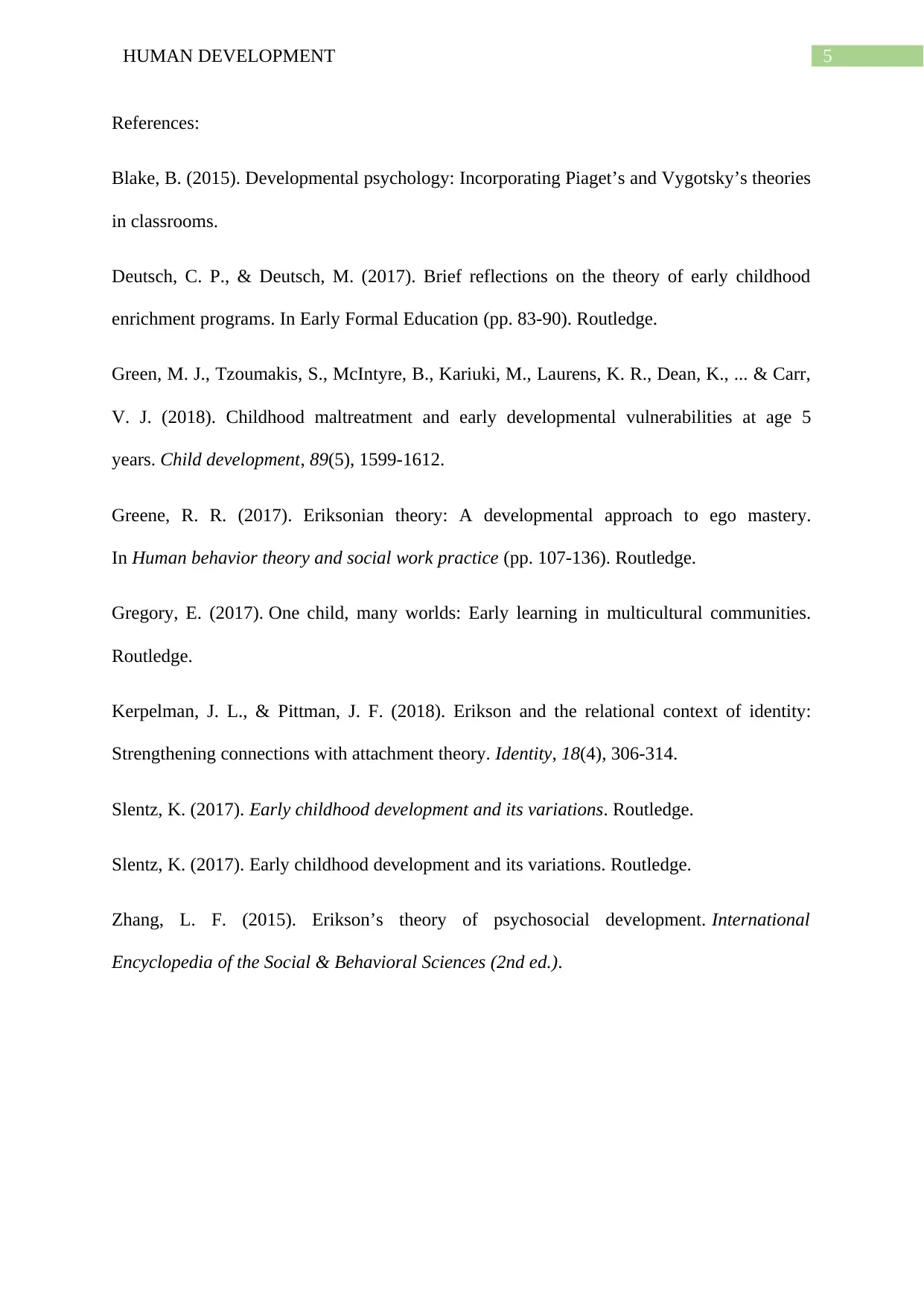
5HUMAN DEVELOPMENT
References:
Blake, B. (2015). Developmental psychology: Incorporating Piaget’s and Vygotsky’s theories
in classrooms.
Deutsch, C. P., & Deutsch, M. (2017). Brief reflections on the theory of early childhood
enrichment programs. In Early Formal Education (pp. 83-90). Routledge.
Green, M. J., Tzoumakis, S., McIntyre, B., Kariuki, M., Laurens, K. R., Dean, K., ... & Carr,
V. J. (2018). Childhood maltreatment and early developmental vulnerabilities at age 5
years. Child development, 89(5), 1599-1612.
Greene, R. R. (2017). Eriksonian theory: A developmental approach to ego mastery.
In Human behavior theory and social work practice (pp. 107-136). Routledge.
Gregory, E. (2017). One child, many worlds: Early learning in multicultural communities.
Routledge.
Kerpelman, J. L., & Pittman, J. F. (2018). Erikson and the relational context of identity:
Strengthening connections with attachment theory. Identity, 18(4), 306-314.
Slentz, K. (2017). Early childhood development and its variations. Routledge.
Slentz, K. (2017). Early childhood development and its variations. Routledge.
Zhang, L. F. (2015). Erikson’s theory of psychosocial development. International
Encyclopedia of the Social & Behavioral Sciences (2nd ed.).
References:
Blake, B. (2015). Developmental psychology: Incorporating Piaget’s and Vygotsky’s theories
in classrooms.
Deutsch, C. P., & Deutsch, M. (2017). Brief reflections on the theory of early childhood
enrichment programs. In Early Formal Education (pp. 83-90). Routledge.
Green, M. J., Tzoumakis, S., McIntyre, B., Kariuki, M., Laurens, K. R., Dean, K., ... & Carr,
V. J. (2018). Childhood maltreatment and early developmental vulnerabilities at age 5
years. Child development, 89(5), 1599-1612.
Greene, R. R. (2017). Eriksonian theory: A developmental approach to ego mastery.
In Human behavior theory and social work practice (pp. 107-136). Routledge.
Gregory, E. (2017). One child, many worlds: Early learning in multicultural communities.
Routledge.
Kerpelman, J. L., & Pittman, J. F. (2018). Erikson and the relational context of identity:
Strengthening connections with attachment theory. Identity, 18(4), 306-314.
Slentz, K. (2017). Early childhood development and its variations. Routledge.
Slentz, K. (2017). Early childhood development and its variations. Routledge.
Zhang, L. F. (2015). Erikson’s theory of psychosocial development. International
Encyclopedia of the Social & Behavioral Sciences (2nd ed.).
⊘ This is a preview!⊘
Do you want full access?
Subscribe today to unlock all pages.

Trusted by 1+ million students worldwide
1 out of 6
Related Documents
Your All-in-One AI-Powered Toolkit for Academic Success.
+13062052269
info@desklib.com
Available 24*7 on WhatsApp / Email
![[object Object]](/_next/static/media/star-bottom.7253800d.svg)
Unlock your academic potential
Copyright © 2020–2026 A2Z Services. All Rights Reserved. Developed and managed by ZUCOL.





